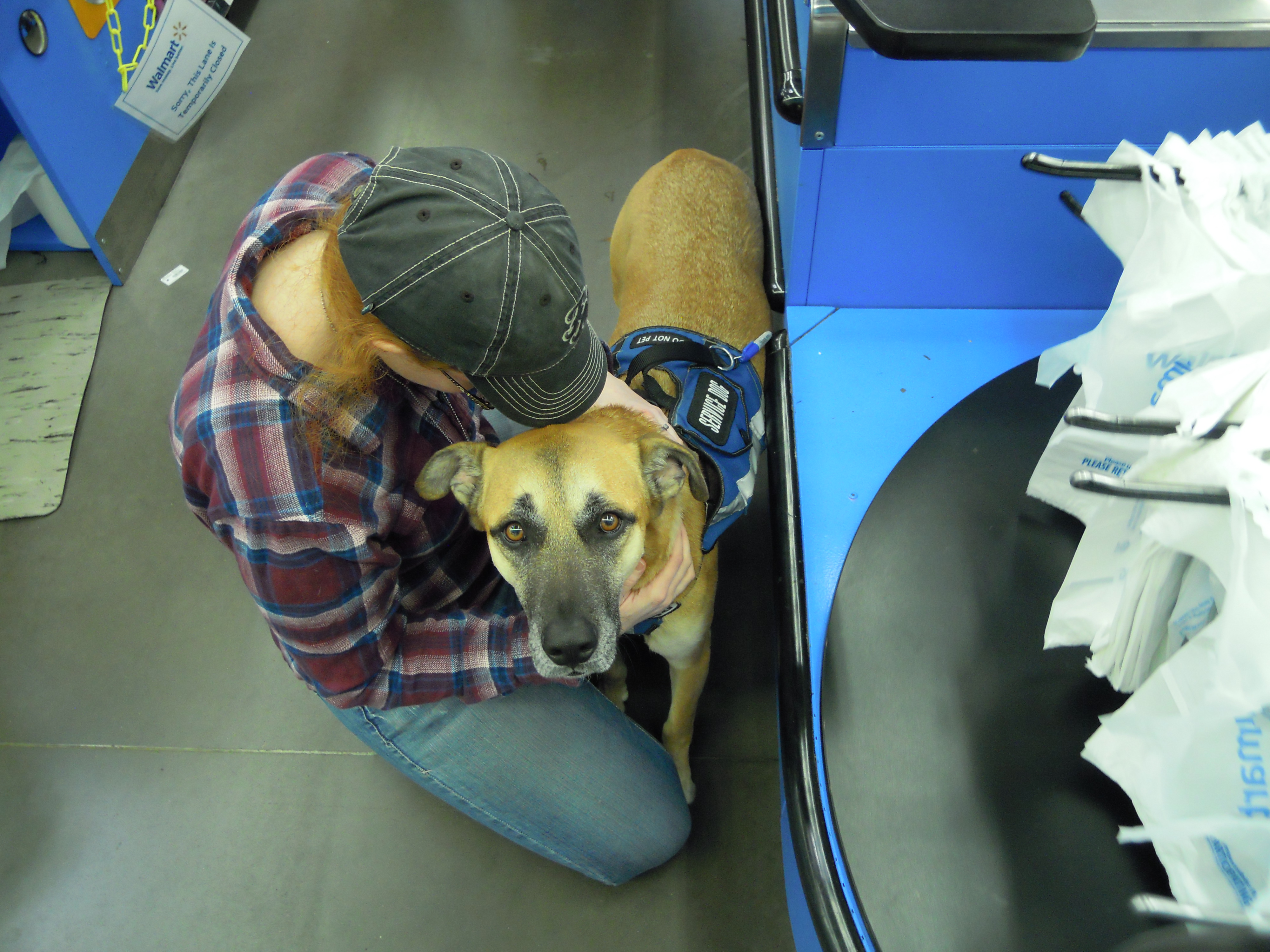Legitimate Service Dog Teams Are Not Jokes
We are drowning in a plethora of misinformation about service dogs and emotional support animals. Every week a new article about a fake service dog or an ESA on an airline gone wrong finds its way into the media. These stories tell one side of the story, while the truth remains invisible, working in silence, working without drawing attention, because that’s how trained dogs are supposed to behave. That’s how real teams are supposed to operate.
Up until last night, I thought the worst side effects to this plague of misinformation and entitlement were the actual risks of an untrained dog hurting a person or a real working team, the unintended damage done to a pet who isn’t properly prepared for handling the stress of being in public, and the increase in frequency of real service dog teams or real ESAs being turned away from accommodations based on previous bad experiences with fakes. Last night, I realized there’s one more piece that adds to this conversation. As the ridiculousness smothers the real, the real is being lumped alongside the fake and everyone becomes a punchline. Real teams, real people who need their dogs for medical assistance are becoming jokes, and that’s not OK.
The internet is a wonderful and terrible thing. It allows people to share information in the blink of an eye, and doesn’t necessarily scrutinize whether that information is true or false. As a result, there is a ton of information about service dogs and emotional support animals available online. The question then becomes, what do you believe? Who do you believe?
There are people right now scamming anywhere from $60 – 100 dollars from ignorant people online by creating fake service dog registries that give out official-looking paperwork and ID cards, but don’t require any proof of training. Within minutes anyone’s dog can go from pet to service dog or pet to emotional support dog with a click of a button, or so they think.
The Truth:
- It takes between 600 – 2000 hours to train a service dog to do its job, or about two years.
- Service dogs undergo extensive training to learn how to listen to their disabled handler in a wide array of situations, how to behave at home and in public, how to perform complex activities known as tasks to assist their disabled handler, and how to remain confident around all sorts of stimuli, scenarios, and environments.
- A person must be disabled in order to need and partner with a service dog
- The handlers (person with a disability) of service dogs are permitted access rights to any public space. This access permission is different from what’s given to therapy dogs or emotional support dogs. Therapy dogs are only permitted in certain public spaces and must have prior permission. Emotional support dogs are only permitted on flights, in non-pet housing, and sometimes doctor or therapist appointments.
- Under U.S. law, service dogs aren’t required to be registered or certified. Therapy dogs are required to be certified. Emotional support animals are not required to be registered or certified, but a doctor’s note is strongly encouraged and can be required in some situations.
- Service dogs have a specific function to perform. They work exclusively with a disabled person in managing that person’s medical condition.
- Therapy dogs are highly trained companions who offer support to strangers and assist communities in coping through difficult times.
- Emotional support animals/dogs are pets with very minimal rights for those who truly need the emotional comfort provided by the animal. Emotional support animals are not trained to do a specific function. They are not trained in how to be a working animal. They may help their owners, but they do so by existing, not from being rigorously trained to do so.
The media perpetuates the cycle of misinformation every time they share a story about a fake ESA or fake service dog and don’t bother to provide their readers with accurate information. The media perpetuates the problem when they share stories about people who successfully parade an ESA all over town, declaring that they have the right to because they “need their dog.” They often don’t bother to research more about that person to determine the truth, and blatantly ignore the fact that owners of ESAs do not even have that kind of access permission.
People are more likely to click on an article that seems outrageous and funny than one that is informative and possibly boring. There are plenty of real service dog stories circulating around, but they aren’t remembered as profoundly as the person who claimed they needed a peacock on their flight for emotional comfort or that funny scene on “Grey’s Anatomy” with a rogue ESA acting out.
I’m not here to demean or criticize the needs of people with anxiety, depression, chronic pain, or other disorders who genuinely find solace in the presence of an emotional support animal, but don’t necessarily need the extensive level of help that comes from a service dog. Whoever you are, good for you for doing what you need to help take care of yourself. But I really hope you’re making smart decisions about how you utilize that golden ticket of “emotional support animal” and are keeping in mind the toll that being in public and being untrained will have on your pet’s own mental stability.
I don’t read articles that talk about the newest outlandish animals someone is calling a service animal or an emotional support animal. They make me fume inside, which triggers stress and pain flares. Each time someone reads an article about a fake service dog, an outlandish emotional support animal, watches a show or movie that cracks jokes about people who must have their dog with them, or watches a show where people fake a dog as a service dog just to take it into a restaurant, the value of real service dog teams is being stripped away. The perception that there really are people out there who need a dog’s assistance is being eroded bit by bit.

We Are Not Your Punchline
There are thousands of real service dog teams all over the world. Right now there are thousands of dogs keeping their disabled handlers alive by helping them manage their various medical conditions.
The man with epilepsy who relies on his service dog to alert to seizures before they happen so he has time to take medication or get someplace safe genuinely needs to take his dog everywhere with him. His needs are not funny or a desperate plea for attention. He is not a joke.
The woman who relies on her guide dog to be her eyes, to help her navigate safely across the road without being hit or to bring her various items she needs to get through her day genuinely needs the aid of her guide dog. Her needs are not funny. She isn’t pretending to be blind so she can take her doggo everywhere. She is not a joke.
I rely on my service dog to prevent pain flares before they strike, to prevent falls before they happen, and to be my hands when my body fails me. I live with a severe, perpetual nerve pain condition, called complex regional pain syndrome. I rely on my service dog to get me off the ground when my brain forgets I have legs, causing me to suddenly collapse. I rely on my service dog to pick up items I drop so an intense migraine or muscle spasms that could dislocate my jaw aren’t triggered when I try to bend over.
I rely on my service dog to help me do simple activities like going for walks, doing laundry, bringing firewood into the house and more because without his help I would be bedridden. I know that for a fact, because before I had his help, I was bedridden. I was ensconced in chains that prevented me from living a half-way normal life; chains of unrelenting nerve pain. The pain is still there, but the chains weighing me down are gone. My service dog lifted those.
I need my service dog to go everywhere with me because without his assistance, I could fall and be stuck on the ground unable to move. I wouldn’t be able to go up stairs in public buildings. I wouldn’t be able to open public doors. I wouldn’t be able to stand up after sitting for more than 20 minutes. I would be constantly getting bombarded with pain flare after pain flare until the chains wrapped around me again and forced me down once more. My needs are not a joke. My disability is not a joke. My service dog and his job are not a joke. I am not a joke.

Last night, I had the “privilege” of being in a room full of people who know I have a real service dog. They were making jokes at my expense because they think it is so preposterous to have to take your dog everywhere. They were even thinking of doing it themselves so they could take their dog everywhere too.
Within moments, a family gathering that I was able to attend because of my service dog’s assistance turned from decent to sour. I became the punchline to a very cruel joke based in misinformation, lack of education, ignorance and a little bit of heartlessness.
Some people think it’s laughable, the idea that someone would need to take a dog everywhere with them, and even that it sounds like fun. They don’t get that for many disabled people, it isn’t an option. It’s work with an assistance dog, go everywhere with your dog, or have no shot at life. Needing a service dog means your whole life is forever altered.
They don’t get that one day it could very well be them who is disabled, or they could have a loved one who needs a service dog, because disability doesn’t discriminate. They don’t get that it means opening yourself up to harassment and interrogation from complete strangers demanding to know your medical history or your dog’s name. They don’t get that it means having a medical condition that likely involves being in horrible pain or living with limitations and restrictions that threaten to overwhelm you and all your dreams. They don’t get that lately it sometimes means being the butt of a joke.
Real service dogs are lifelines. Real service dogs are literally helping to give disabled people like me a chance at a full life. They are lifting the chains that would otherwise force many disabled people to remain shut-ins. They are not a joke.

